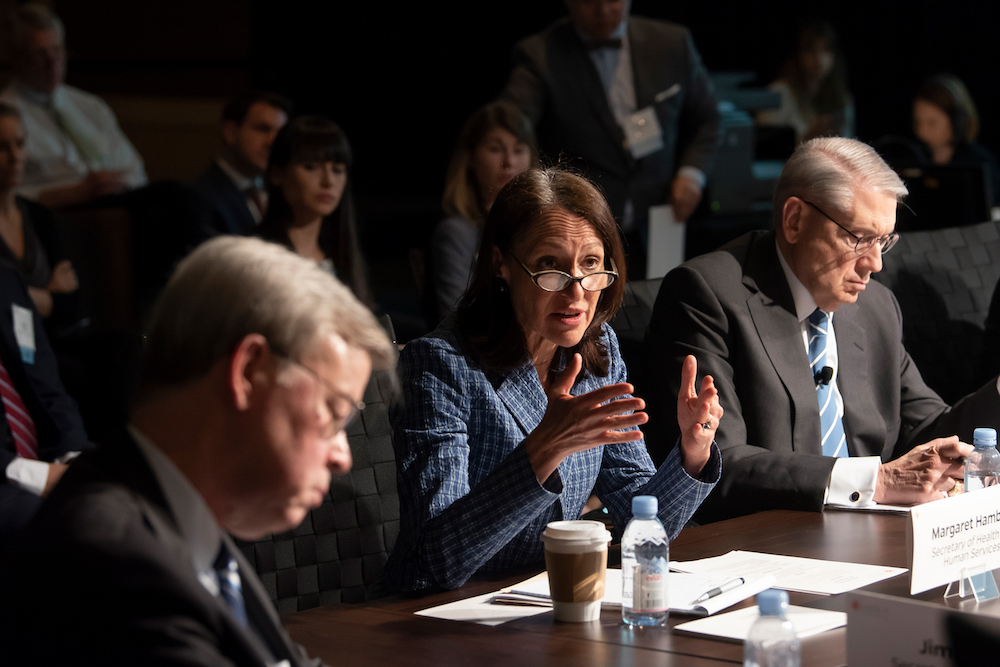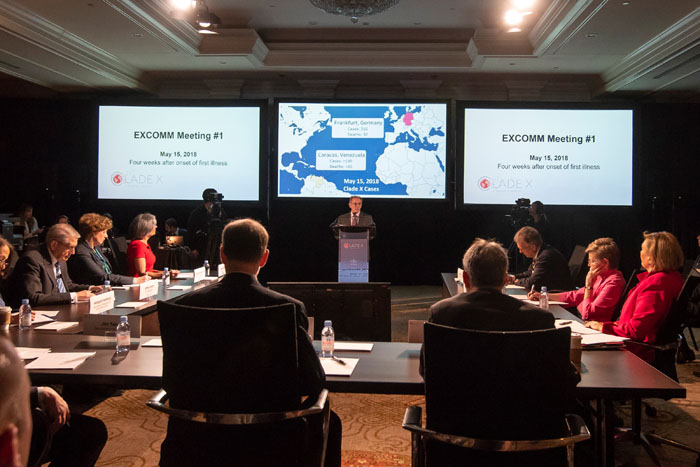pandemic influenza
See the following -
Clade X pandemic exercise highlights policies needed to prevent or reduce the worst possible outcomes in future pandemics
 The outbreak of a moderately contagious and moderately lethal novel pathogen precipitated a catastrophic end to the scenario in Clade X, the day-long pandemic tabletop exercise hosted by the Johns Hopkins Center for Health Security on May 15 in Washington, DC. Clade X simulated a series of National Security Council–convened meetings of 10 US government leaders, played by individuals prominent in the fields of national security or epidemic response. Their dialogue as the scenario unfolded addressed significant uncertainties in current prevention and response capabilities, hamstrung by policy challenges at the federal level.
The outbreak of a moderately contagious and moderately lethal novel pathogen precipitated a catastrophic end to the scenario in Clade X, the day-long pandemic tabletop exercise hosted by the Johns Hopkins Center for Health Security on May 15 in Washington, DC. Clade X simulated a series of National Security Council–convened meetings of 10 US government leaders, played by individuals prominent in the fields of national security or epidemic response. Their dialogue as the scenario unfolded addressed significant uncertainties in current prevention and response capabilities, hamstrung by policy challenges at the federal level.
- Login to post comments
Peer into the Post-Apocalyptic Future of Antimicrobial Resistance
Aout 4 million years ago, a cave was forming in the Delaware Basin of what is now Carlsbad Caverns National Park in New Mexico. From that time on, Lechuguilla Cave remained untouched by humans or animals until its discovery in 1986—an isolated, pristine primeval ecosystem. When the bacteria found on the walls of Lechuguilla were analyzed, many of the microbes were determined not only to have resistance to natural antibiotics like penicillin, but also to synthetic antibiotics that did not exist on earth until the second half of the twentieth century...
- Login to post comments
This mock pandemic killed 150 million people. Next time it might not be a drill
 A novel virus, moderately contagious and moderately lethal, has surfaced and is spreading rapidly around the globe. Outbreaks first appear in Frankfurt, Germany, and Caracas, Venezuela. The virus is transmitted person-to-person, primarily by coughing. There are no effective antivirals or vaccines...So began a recent day-long exercise hosted by the Johns Hopkins Center for Health Security. The simulation mixed details of past disasters with fictional elements to force government officials and experts to make the kinds of key decisions they could face in a real pandemic. It was a tense day. The exercise was inspired in part by the troubled response to the Ebola epidemic of 2014, and everyone involved was acutely aware of the very real and ongoing Ebola outbreak spreading in Congo.
A novel virus, moderately contagious and moderately lethal, has surfaced and is spreading rapidly around the globe. Outbreaks first appear in Frankfurt, Germany, and Caracas, Venezuela. The virus is transmitted person-to-person, primarily by coughing. There are no effective antivirals or vaccines...So began a recent day-long exercise hosted by the Johns Hopkins Center for Health Security. The simulation mixed details of past disasters with fictional elements to force government officials and experts to make the kinds of key decisions they could face in a real pandemic. It was a tense day. The exercise was inspired in part by the troubled response to the Ebola epidemic of 2014, and everyone involved was acutely aware of the very real and ongoing Ebola outbreak spreading in Congo.
- Login to post comments